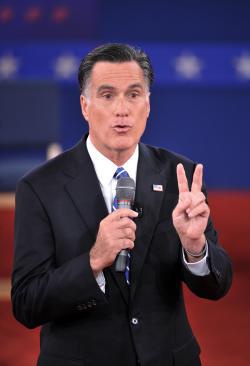After two debates with almost no mention of women—even the abortion question in the vice presidential debate framed the issue as one of men’s personal beliefs instead of women’s rights—we finally got a solid question about equal pay from an audience member in the town hall presidential debate.
QUESTION: In what new ways to you intend to rectify the inequalities in the workplace, specifically regarding females making only 72 percent of what their male counterparts earn?
Mitt Romney knows this is a weak spot for him. He took a beating on his campaign’s unwillingness to offer support for equal pay legislation earlier this year, and his running mate, Paul Ryan, voted against the Lilly Ledbetter Act to secure a woman’s right to sue after she’s suffered pay discrimination. Even though Romney’s been showing off his moderate shtick at the debates, he wasn’t going to go far enough to say that equal pay is a right. Instead, he framed it as a matter of employer largess:
ROMNEY: … Important topic, and one which I learned a great deal about, particularly as I was serving as governor of my state, because I had the chance to pull together a cabinet and all the applicants seemed to be men.
And I went to my staff, and I said, “How come all the people for these jobs are—are all men.” They said, “Well, these are the people that have the qualifications.” And I said, “Well, gosh, can’t we—can’t we find some—some women that are also qualified?”
And—and so we—we took a concerted effort to go out and find women who had backgrounds that could be qualified to become members of our cabinet.
I went to a number of women’s groups and said, “Can you help us find folks,” and they brought us whole binders full of women.
Romney’s phrase “binders full of women” is what immediately grabbed the attention of the online hordes, enough so that a Tumblr collecting mockery of it has already been created. And while it was an amusingly daft turn of phrase (and the Internet never ceases to amaze), the real problem with Romney’s answer is that his only solution to the obstacles women face when seeking fair pay is that employers need to volunteer to pay it.
Romney went on to correctly observe that inflexible work schedules disproportionately affect women, but that’s a different issue from the wage gap, and even then, his only real solution is to leave it up to employers to decide if they care enough to offer flex time. He tried to soften this laissez faire approach to discrimination against women by promising that employers will be so desperate to hire when he’s president they’ll pretty much be forced to take women: “We’re going to have to have employers in the new economy, in the economy I’m going to bring to play, that are going to be so anxious to get good workers they’re going to be anxious to hire women.”
Even if Romney really could create the wonderland of employers begging for employees that he imagines here—a claim that earned him four Pinocchios from the Washington Post—there’s no reason to believe that new economy would somehow force employers to start treating female employees fairly. If the free market alone could fix the problem, then women during boom times would have, according to Romney’s logic, achieved equal pay. They did not. That’s because the problem is far more complex than Romney lets on here. A little bit more flex time is nice, but it doesn’t do enough to make up for the yawning gaps in affordable child care, for instance. Plus, Romney completely breezed by the continuing problem of discrimination, which is all the Lilly Ledbetter Act addresses.
He also breezed by his position on contraception, side-stepping his campaign’s support of another type of employee discrimination: employers who want to deny their employees the contraception coverage those employees have paid for. The reality, ugly as it may be to some, is that we need more aggressive government intervention to overcome the various social obstacles that prevent women from achieving true equality with men in the employment market. “Binders full of women” is an evocative image, but Romney’s utter unwillingness to address the true causes of inequality is the real story here.
